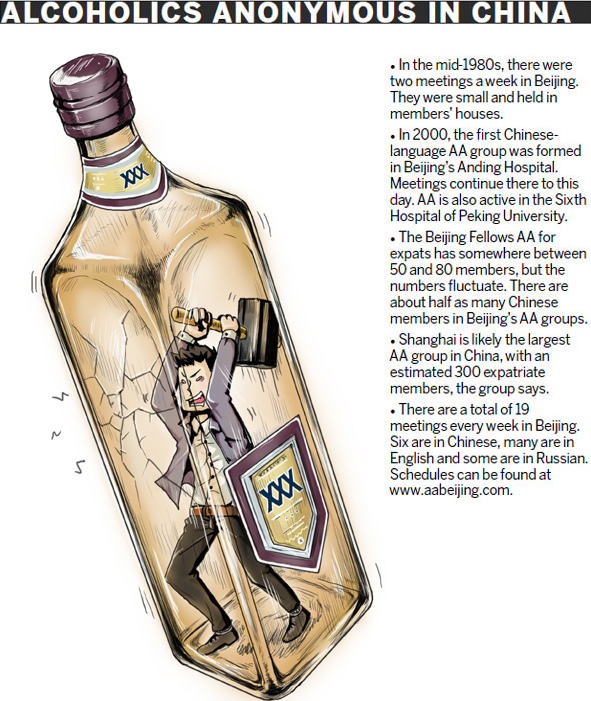Alcoholism is on the rise in China but is rarely recognized as a disease. And those who realize they have a problem are often reluctant to seek help because of the stigma. China Daily reports.
Lu Lu had her first drink around the same time she said her first word. Family members at her home in a northeastern Chinese province often gave her sips of alcohol for the amusement of her reaction.
They were proud she liked the taste. "They loved a baby girl drinking. A drinking girl was a hero," says Lu, who asks not to use her real name.
 |
|
Zhang Jieye For China Daily. |
Drinking culture in China predates its recorded history, artifacts show. And it has become more widespread since the 1980s, following the reform and opening-up, reports say.
A nationwide Wiley-Blackwell study that surveyed 50,000 people found 56 percent of men and 15 percent of women were drinkers. Nearly 60 percent of male drinkers and 30 percent of female drinkers were classified as binge drinkers, consuming alcohol five to seven days of the week.
"What makes China unique among other heavy drinking countries is that drinking frequency, quantity and binge drinking increase with age. The heaviest Chinese drinkers are middle-aged or beyond, while drinking levels in other countries tend to peak in people's late teens and early twenties," the study says.
Despite frequent exposure, Lu can count on one hand how many times she got drunk in her younger years. And despite her proud family, she says, the social stigma attached to women who drink kept her away from the bottle.
"The gender difference in China is big," Lu says.
"A publicly drunken woman looks lousy."
But when she left home to study in France, her alcoholic tendencies began to surface.
"It was just so convenient to get alcohol, and everyone was drinking," she says.
"France has a horrible drinking culture."
A study conducted by France's Observatory on Drugs and Addiction found "repeated drunkenness" among young French has risen 10 percent since 2000. The study found "repeated drunkenness" among young women has doubled during the same period.
Lu admits it was never about the culture or country. She drank because she liked her drunken self more than her sober self - a shy person, afraid of other people and life's responsibilities.
"I was so smart when I was drunk," she says.
"I could talk with anyone, and my speech was excellent. I loved the feeling of freedom and knowing I didn't need to control myself anymore."
Beijing United Family Hospital clinical psychologist George Hu says there are plenty of advantages to using alcohol, such as its tendency to be a social lubricant.
